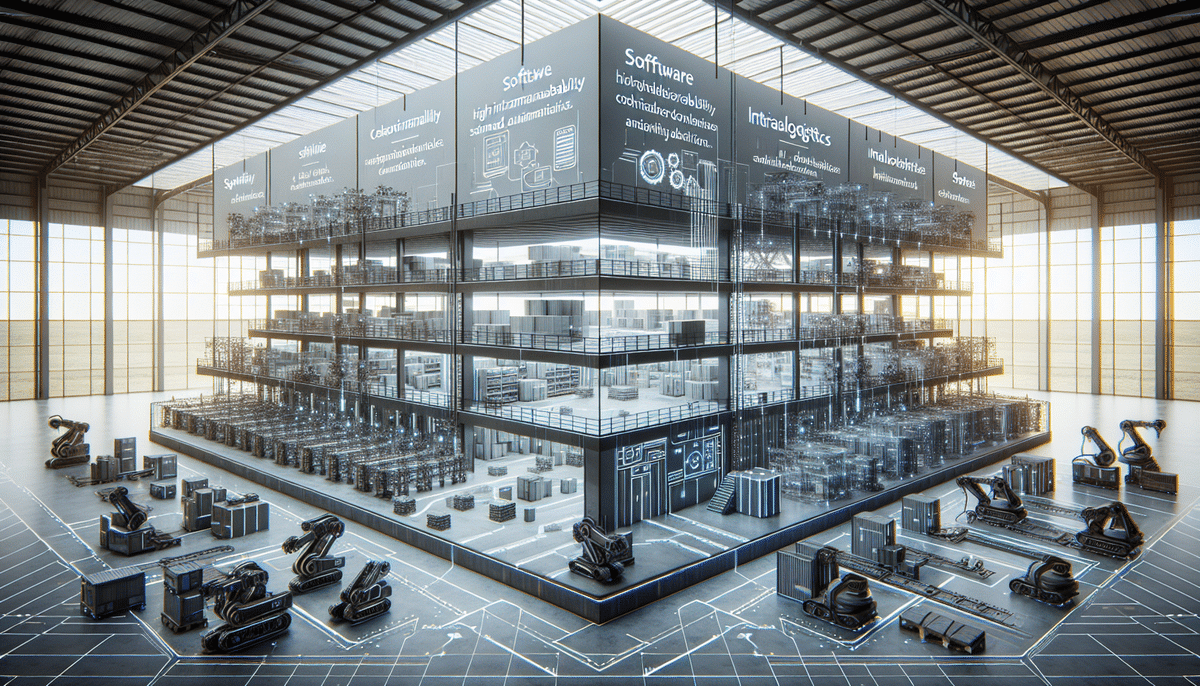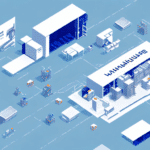Dematic vs Locus Robotics: Comprehensive Comparison for Warehouse Automation
In the rapidly evolving landscape of warehouse automation, Dematic and Locus Robotics stand out as two of the most influential players. Both companies offer advanced robotic solutions designed to enhance warehouse efficiency, productivity, and accuracy. However, their approaches, product offerings, and market focuses exhibit distinct differences that can influence your decision when selecting the right partner for your automation needs. This article delves into a detailed comparison of Dematic and Locus Robotics, providing insights backed by recent data and expert analyses to help you make an informed choice.
Introduction to Dematic and Locus Robotics
Dematic is a global leader in automated solutions for manufacturing, warehousing, and distribution industries. They specialize in designing and implementing custom solutions that optimize supply chain performance, enhance efficiency, and boost productivity. Dematic's portfolio includes material handling equipment, order fulfillment systems, and advanced robotic solutions.
Locus Robotics, based in Massachusetts, focuses exclusively on robotic solutions for warehouse fulfillment. Their mobile robots collaborate with human workers to increase pick rates and improve accuracy. Designed for easy implementation, Locus Robotics' solutions integrate seamlessly with existing warehouse management systems, offering a flexible and scalable approach to automation.
Both companies emphasize sustainability and innovation. Dematic prioritizes energy-efficient systems and sustainable materials, aiming to reduce environmental impact. Locus Robotics has garnered recognition for its innovative technologies, winning awards such as the RBR50 Robotics Innovation Award and the MHI Innovation Award.
The History and Background of Dematic and Locus Robotics
Founded in 1819 in Luxembourg, Dematic started as a manufacturer of bagging machines and has evolved into a powerhouse in automated supply chain solutions. In 2016, Dematic was acquired by KION Group, enhancing its global reach and technological capabilities.
Locus Robotics was established in 2014 by Rick Faulk, a seasoned tech industry veteran. Despite being a relatively young company, Locus Robotics has rapidly expanded, securing significant venture capital funding and forming strategic partnerships with major retailers and logistics providers like DHL Supply Chain and GEODIS. Their collaborative robots are designed to work alongside human workers, enhancing operational efficiency and reducing workplace injuries.
According to a Forrester report, the adoption of robotics in warehouses has increased by 25% in the past year, highlighting the growing importance of companies like Dematic and Locus Robotics in the industry.
An Overview of Dematic's Robotics Solutions
Dematic offers a comprehensive range of robotic solutions tailored to various aspects of warehouse operations:
- Automated Guided Vehicles (AGVs): These vehicles transport materials throughout the warehouse, reducing the need for manual handling.
- Automated Storage and Retrieval Systems (AS/RS): These systems efficiently store and retrieve items, optimizing space utilization.
- Robotic Piece Picking Solutions: These robots assist in picking individual items, increasing accuracy and speed.
One of Dematic's standout features is their robust software and control systems, which provide real-time data analytics and process optimization. This integration allows for predictive maintenance, reducing downtime and operational costs.
According to Dematic's 2023 White Paper on Warehouse Efficiency, their robotic solutions can increase warehouse throughput by up to 30% while reducing labor costs by 20%.
An Overview of Locus Robotics' Solutions
Locus Robotics specializes in mobile robotic solutions that enhance order fulfillment processes:
- Autonomous Mobile Robots: These robots navigate warehouses using proprietary software, assisting human workers in locating and picking inventory.
- Collaborative Platforms: Their systems enable seamless collaboration between robots and human associates, optimizing workflow and reducing errors.
- Analytics Platform: Provides real-time insights into warehouse performance, helping managers make data-driven decisions.
Locus Robotics' mobile robots are designed for quick deployment, typically within weeks, making them an attractive option for warehouses looking to scale operations rapidly.
In a recent case study, a major e-commerce retailer reported a 50% increase in pick rates and a 40% improvement in order accuracy after implementing Locus Robotics' solutions (See Case Studies).
Comparison of Dematic and Locus Robotics
When evaluating Dematic versus Locus Robotics, several critical factors emerge:
- Solution Scope: Dematic offers a broader range of automated solutions, including AGVs and AS/RS, suitable for large-scale operations. Locus Robotics focuses exclusively on mobile robots, making it ideal for specific order fulfillment tasks.
- Customization and Flexibility: Dematic's solutions are highly customizable, allowing for tailored implementations. Locus Robotics provides flexible solutions that are easier to integrate but may offer less customization.
- Scalability: Both companies offer scalable solutions, but Dematic's extensive product range may provide more options for growing businesses.
- Cost: Generally, Locus Robotics' solutions are more cost-effective upfront, while Dematic's comprehensive systems may require a higher initial investment but offer long-term scalability and versatility.
Ultimately, the right choice depends on your warehouse's specific needs, budget, and long-term automation goals.
Key Features and Benefits of Dematic's Solutions
Dematic's robotic solutions come with several notable features and benefits:
- Customizable and Flexible: Solutions can be tailored to meet the unique requirements of any warehouse environment.
- Scalable: Easily expandable to accommodate business growth and changing operational demands.
- Advanced Software Integration: Provides real-time data analytics, predictive maintenance, and process optimization.
- Industry Experience: Over two centuries of expertise in supply chain solutions ensures reliable and effective implementations.
- Sustainability: Focus on energy-efficient equipment and sustainable materials to minimize environmental impact.
Dematic's commitment to sustainability is highlighted in their sustainability initiatives, which aim to reduce energy consumption and promote recycling within their operations.
Key Features and Benefits of Locus Robotics' Solutions
Locus Robotics offers several advantages with their mobile robotic solutions:
- User-Friendly Integration: Easily integrates with existing warehouse management systems, minimizing disruption.
- Rapid Implementation: Solutions can be deployed quickly, often within a few weeks.
- Collaborative Robotics: Robots work alongside human associates, enhancing productivity without replacing jobs.
- Enhanced Pick Rates and Accuracy: Significant improvements in order fulfillment metrics.
- Real-Time Analytics: Comprehensive analytics platform provides actionable insights for warehouse optimization.
According to Locus Robotics' resources page, their solutions have helped clients achieve up to a 65% increase in order throughput and a 99.9% accuracy rate.
Customer Reviews and Testimonials
Dematic's Solutions
Customers consistently praise Dematic for the flexibility and scalability of their solutions. For instance, a leading distributor noted that Dematic's AGVs have significantly reduced labor costs and increased throughput by 25%. However, some reviews highlight the higher initial investment costs, which can be a consideration for smaller businesses.
"Dematic's automated systems transformed our warehouse operations, improving efficiency and reducing errors. The upfront cost was substantial, but the ROI has been impressive." – Operations Manager, Major Distributor
Locus Robotics' Solutions
Locus Robotics receives positive feedback for the ease of implementation and the immediate impact on pick rates and accuracy. A top e-commerce company reported a 50% increase in order fulfillment speed after deploying Locus Robotics' mobile solutions. Some concerns have been raised regarding the maintenance and reliability of the robots, although overall satisfaction remains high.
"Implementing Locus Robotics was a game-changer for our fulfillment process. The robots work seamlessly with our staff, and we've seen a significant boost in productivity." – Logistics Director, Leading E-commerce Retailer
Pricing Comparison between Dematic and Locus Robotics
Pricing structures for Dematic and Locus Robotics vary based on the scope and scale of the solutions:
- Locus Robotics: Offers a more cost-effective entry point with lower initial investment costs. Their pricing model is typically based on a subscription or leasing arrangement, which includes maintenance and support.
- Dematic: Generally involves a higher upfront investment due to the comprehensive nature of their solutions. However, the long-term scalability and customization options can provide significant value for large enterprises.
According to industry benchmarks, deploying Locus Robotics' solutions can cost approximately 30-40% less initially compared to Dematic's full-scale automation systems. However, businesses should consider their long-term automation needs and potential ROI when making a decision.
Dematic vs Locus Robotics: Which is the Better Choice?
The decision between Dematic and Locus Robotics hinges on your warehouse's specific needs:
- Dematic is ideal for large-scale operations requiring a wide range of customizable and scalable automation solutions. Their expertise and comprehensive systems make them a suitable choice for enterprises looking to invest heavily in long-term automation.
- Locus Robotics is better suited for businesses seeking a cost-effective, quickly deployable solution focused on enhancing order fulfillment processes. Their collaborative robots provide immediate improvements in productivity and accuracy with minimal disruption.
Ultimately, evaluating your operational goals, budget constraints, and desired level of customization will guide you in choosing the right partner for your warehouse automation journey.
Factors to Consider When Choosing Between Dematic and Locus Robotics
Several key factors should influence your decision:
- Budget and Cost Constraints: Assess your financial capacity for initial investments and ongoing maintenance costs.
- Warehouse Specific Needs: Identify the specific areas in your operations that require automation, such as material handling, order fulfillment, or inventory management.
- Scalability and Flexibility: Consider how easily the solution can adapt to your business growth and changing operational demands.
- Reliability and Maintenance: Evaluate the reliability of the robots and the availability of support and maintenance services.
- Integration with Existing Systems: Ensure that the chosen solution can seamlessly integrate with your current warehouse management systems.
- Vendor Expertise and Support: Look for vendors with proven expertise, robust support services, and positive customer feedback.
How Dematic and Locus Robotics are Revolutionizing the Warehouse Industry
The integration of robotics in warehouse operations has revolutionized the industry by enhancing efficiency, reducing costs, and improving accuracy. Dematic and Locus Robotics are at the forefront of this transformation, offering solutions that streamline processes and adapt to the dynamic demands of modern supply chains.
According to a McKinsey report, warehouses utilizing advanced robotics have seen a 20-30% increase in operational efficiency and a significant reduction in error rates. These advancements not only improve internal processes but also elevate the overall customer experience through faster and more reliable order fulfillment.
The Future of Warehouse Automation with Dematic vs Locus Robotics
The future of warehouse automation is poised for continued growth and innovation. Both Dematic and Locus Robotics are investing in emerging technologies such as artificial intelligence (AI), machine learning, and collaborative robotics to further enhance their solutions.
Dematic is exploring the integration of AI to enable more predictive and adaptive warehouse systems, allowing for greater flexibility and responsiveness to market changes. Meanwhile, Locus Robotics is focusing on enhancing their mobile robots' capabilities, including better navigation, improved collaboration features, and advanced data analytics.
As the demand for efficient and scalable warehouse operations grows, the roles of Dematic and Locus Robotics will become increasingly vital. Businesses that adopt these advanced automation solutions will be better positioned to meet the challenges of a competitive market and deliver superior value to their customers.
For more insights on warehouse automation trends and technologies, explore resources from industry leaders like McKinsey & Company.




















